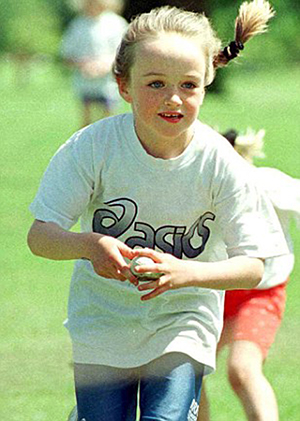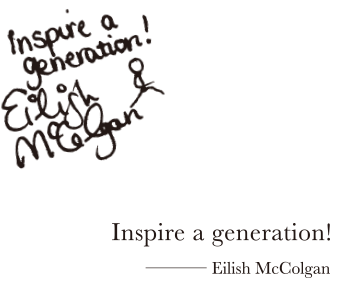

© Keita Yasukawa

“Aim for the highest cloud, so that if you miss it, you will hit a lofty mountain.”
Always aim for the highest cloud in the sky. Doing that, even if you don’t reach it, you will still be able to stand on a peak. From there, the highest cloud isn’t so far off.
This is a proverb that has been passed down by the Maori since long, long ago. They are words that have become the cornerstone of my life as an athlete.
Every day of my life, I try to put all my effort into achieving a goal. It’s always my utmost effort, with no holding back. That way, even if I don’t achieve the goal, I can have pride in what I did. The results of that effort make me grow further as a person, and drive me on to strive for the next goal.
There’s no shortcut to achieving a goal, glory and success.
Doing something the wrong way might be easy, but the results are a flimsy replacement for the real thing, will fall to pieces, and reflect badly on you.
Say you stray from the clean path: Will you be able to stand in front of your family, friends, children who have made sport their dream, fans, and smile from the heart?
If you weigh winning achieved the wrong way and defeat suffered after fair, square effort, it’s plain and clear which is worth more.
I treasure the beauty of tears of frustration that I shed with my pride nevertheless intact. Those bitter tears are a source of strength, and I believe they lead to the path of true glory.


© Eilish McColgan

Maybe it was something to do with both my parents being long distance runners, but as a kid I loved running far and keeping myself moving. My parents never once put pressure on me to take up running, and indeed I also played hockey, tennis and, at times, golf.
Yet while on the one hand I was very physically active, I was very quiet and unconfident. I was terrible in front of other people. However, I remember myself as having run to shake off unpleasantness, and running being the only way I felt I could freely express myself.
At that time, it was a case of running just because I liked it. I threw myself into it and gave it my all because I liked running. But something brought about a big change in that way of thinking. It was in January 2013, at a training camp I took part in in Kenya, about half a year after I failed to make it to the finals for the London Olympic Games 3,000m steeplechase.
There’s a village called Iten in a mountain valley in Kenya where large numbers of top athletes train daily.
Seeing how those athletes engaged in competition had a huge impact on me. For those athletes, running was a chance they’d been given to improve their lives. It wasn’t just part of their lifestyle, it was life itself to them.
I was attending university then and working as well, and I probably saw running as an extension of my interests.
But experiencing what I did in Kenya made me come to a firm resolution.
I wanted to be world class, I wanted to be just like them.
So what should I do to achieve that? What did running mean to me? It was a time to face myself square on. It was a big turning point, and as an athlete I came one step closer to success.

© Michael Steele / gettyimages
With my experience of the training camp in Kenya in the January after the 2012 London Summer Olympic Games, I developed greatly, both physically and mentally. Following that I graduated university, quit a part-time job, and began life as a full-time athlete.
I can’t imagine being what I am now, believing in myself and keeping on running, if it weren’t for the huge influence my mother had on me as an athlete who shone and made stunning achievements.
I was born two years after my mother won a silver medal for the women’s 10,000m at the 1988 Seoul Olympic Games. Then the year after I was born she won a dazzling victory: a gold medal in the women’s 10,000m at the 1991 World Championships in Athletics in Tokyo. She kept training right up until I was born, and took up running again as soon as she could following my birth.
When I look at her training diary from that time, I get a glimpse of the untiring effort she put in.
My mother’s words to me upon graduating from university were strict but warm: “This is where the hard work now begins.”
Then hard times quickly came my way in the form of an injury.
It required a major operation, so this year (October 2015: the time of the interview) I haven’t been able to run a single stride. For an athlete, not running at all for a period of no less than 10 months is almost impossible to put up with, but I followed the course of treatment, and at last I am seeing light at the end of the long, dark, winding tunnel.
Perhaps at the end of that tunnel a steep, grueling slope lies in wait. But if that’s the path that leads to the Rio Olympics, so be it. I’m full of passion for running, a passion I felt all the more keenly during my time of my rehabilitation, and I’m ready for anything.
My mother, who has lived a clean, wholesome life as an athlete, who has overcome numerous challenges, and who made it all the way to the top says to me “If I can do it, so can you.” This great athlete who achieved success is my mother and also my coach. I’m truly blessed in having a role model like my mother, and couldn’t ask for any better. Thanks to her, I have been able to take on an attitude, in a very natural way, whereby even troubles can be seen in a positive light.
I respect my mother and believe what she tells me, I believe in myself, and I’m going to keep fighting my way to the Rio Olympic Games.
I also want to do it for the sake of showing just what a clean athlete is capable of.

© Keita Yasukawa

“Plant trees you’ll never see.”
Even if you never have the chance to see a future tree that has grown tall, plant a sapling with an eye to the future.
No one knows when an effort will be rewarded. And there are various forms of reward.
Say, for example, that the reward for all-out training is the glamour of an Olympic gold medal. This, of course, is one form of reward. But, say you solidly try and try again from the time you enter elementary school and finally manage to do a back hip circle by the time you graduate. This is also an amazing reward for your efforts.
So it’s impossible to compare them and say which is greater and which is lesser.
When I get the opportunity to interact with children at the nearby school, I do so with the idea of planting a small sapling.
There may well be children among them whom I influence and who then appear in a future Olympics. Or there may be children in low spirits who get to start running around the school grounds with the others.
Becoming a top athlete and winning gold medals is not a goal that’s right for everyone. I want to spread the word that sport contains something of great value.
A good role model provides good stimulus, and from that is created a well-formed link to the next generation. I believe that this process brings forth new leaders, and makes for a bright future in the sporting world.
I’m an active athlete, still only 25 years old, but together with retired athletes I have the opportunity to play a role in promoting clean sport.
I want to keep spreading the word to athletes of my generation and the next about clean sport and how it makes sport so much better.
And I want to get more and more clean sporting colleagues to raise their voices together with me about it. Also, together with others I want to give sport an even brighter shine, and take what I have received from the clean athletes who mentored me and hand on something even better.

© Keita Yasukawa
Having parents who were both athletes, and having run ever since I was able to, I find it difficult to talk about myself without mentioning sport.
It’s been a long chase, but it was through sport that this shy, retiring little girl came to win battles as an athlete on the world stage.
And to continue taking on world-level challenges, I have to keep spreading the message of clean sport. But it’s not just about me. I have a responsibility to become a role model for children who will lead the next generation, and exert a good influence.
Through sport, I have been able to visit various countries throughout the world, come into contact with other cultures, and encounter great numbers of outstanding people. I’ve also made many, many friends who I can share laughs and encouragement with both on and off the track. Being with them expands my sense of values and makes me a richer person.
You can’t be afraid of failure. You must work towards the goal with unshakeable conviction.
Everything I have learned through sport can be put to work in a variety of fields and be of value in living life itself.
My life is a work in progress. There is still a lot to come.
As an athlete, and as an individual, it is my wish that I develop further, along with my sport.
I don’t want to be afraid of taking the long way, but want to choose a way of living that is bold and straightforward.
And when I succeed – and even when I fail – I want to take pride in the process, have no regrets, and wear as broad and bright a smile as ever.



Born in 1990.
The following year, she came to Japan with her mother, who was participating in the 1991 Tokyo IAAF World Championships in Athletics. Her mother, Liz McColgan-Lynch, took home a magnificent gold medal in the women’s 10,000m.
Eilish has been familiar with sports since childhood, having started down the track and field path in earnest by receiving training from her mother around the age of 13. After her debut in the 2011 European Athletics Championships, she ran in the 3,000 metres steeplechase in the 2012 London Olympic Games in England. She graduated from the University of Dundee the following year and made her start as a full-time athlete.
Besides her sporting activities as an active athlete, she has participated in many international events as a UK Anti-Doping Athlete Role Model and is helping to spread clean sport.